ASIMADOLINE
- CAS NO.:153205-46-0
- Empirical Formula: C27H30N2O2
- Molecular Weight: 414.54
- MDL number: MFCD00925628
- SAFETY DATA SHEET (SDS)
- Update Date: 2024-10-23 13:36:13
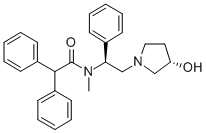
What is ASIMADOLINE?
The Uses of ASIMADOLINE
Acimadolin is a K-opioid agonist that raises the sensitivity threshold in patients with irritable bowel syndrome (IBS), barely crosses the blood-brain barrier, and is well tolerated. It cannot significantly improve the pain threshold of patients, Can significantly reduce pain intensity.
Biological Activity
Asimadoline (EMD-61753) is an orally active, selective, peripherally active κ-opioid agonist with IC50s of 5.6 nM and 1.2 nM for guinea pig and human recombinant κ-opioid, respectively. It has low permeability to the blood-brain barrier and has peripheral anti-inflammatory effects. Also Asimadoline improves allodynia in diabetic rats and has potential for irritable bowel syndrome (IBS) research.
in vitro
Asimadoline (EMD-61753) has high selectively in κ: μ: δ opioid binding ratios of 1:501:498 in human recombinant receptors. The IC 50 for Asimadoline binding to μ -opioid receptors is 3 μM and to δ-opioid receptors is 0.7 μM. The IC 50 values for D1, D2, kainate, σ, PCP/NMDA, H1, α1, α2, M1/M2, glycine, 5HT1A, 5HT1C, 5HT1D, 5HT2, 5HT3, AMPA and kainate/AMPA receptors are all >10 μM.
It has affinity to sodium and L type Ca 2+ ion channels at IC 50 concentrations 150 to 800 fold the IC 50 for the κ receptors.
At high concentrations, Asimadoline demonstrates spasmolytic action against 400 μM barium chloride in the rat duodenum (IC 50 =4.2 μM), suggesting that Asimadoline may block the direct stimulant effects of barium on smooth muscle through mechanisms that are not identified.
in vivo
Asimadoline (EMD-61753; 1, 5, 15 mg/kg; sc) acutely ameliorates both formalin-evoked hyperalgesia and tactile allodynia in diabetic rats.
The absorption rate following oral administration is 80% in rats and >90% in dogs and monkeys. The metabolism of Asimadoline is rapid and appears similar in animals and man. Asimadoline has peripheral anti-inflammatory actions that are partly mediated through increase in joint fluid substance P levels.
Properties of ASIMADOLINE
| Boiling point: | 605.8±55.0 °C(Predicted) |
| Density | 1.170±0.06 g/cm3(Predicted) |
| storage temp. | 2-8°C |
| solubility | DMSO: 103 mg/ml |
| form | A crystalline solid |
| pka | 14.79±0.20(Predicted) |
| color | White to off-white |
Safety information for ASIMADOLINE
| Signal word | Warning |
| Pictogram(s) |
 Environment GHS09 |
| GHS Hazard Statements |
H410:Hazardous to the aquatic environment, long-term hazard |
| Precautionary Statement Codes |
P273:Avoid release to the environment. P391:Collect spillage. Hazardous to the aquatic environment |
Computed Descriptors for ASIMADOLINE
New Products
Tert-butyl bis(2-chloroethyl)carbamate 4-Methylphenylacetic acid N-Boc-D-alaninol N-BOC-D/L-ALANINOL 3-Morpholino-1-(4-nitrophenyl)-5,6-dihydropyridin- 2(1H)-one Furan-2,5-Dicarboxylic Acid Tropic acid DIETHYL AMINOMALONATE HYDROCHLORIDE 1,1’-CARBONYLDIIMIDAZOLE R-2-BENZYLOXY PROPIONIC ACID 1,1’-CARBONYLDI (1,2-4 TRIAZOLE) N-METHYL INDAZOLE-3-CARBOXYLIC ACID (2-Hydroxyphenyl)acetonitrile 4-Bromopyrazole 5-BROMO-2CYANO PYRIDINE 5,6-Dimethoxyindanone 5-broMo-2-chloro-N-cyclopentylpyriMidin-4-aMine 2-(Cyanocyclohexyl)acetic acid 4-methoxy-3,5-dinitropyridine 2-aminopropyl benzoate hydrochloride 1-(4-(aminomethyl)benzyl)urea hydrochloride diethyl 2-(2-((tertbutoxycarbonyl)amino) ethyl)malonate tert-butyl 4- (ureidomethyl)benzylcarbamate Ethyl-2-chloro((4-methoxyphenyl)hydrazono)acetateRelated products of tetrahydrofuran

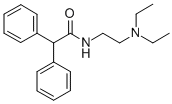

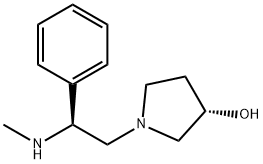

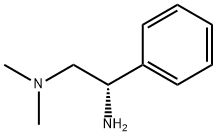
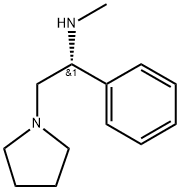

You may like
-
 2033-24-1 98%View Details
2033-24-1 98%View Details
2033-24-1 -
 1975-50-4 98%View Details
1975-50-4 98%View Details
1975-50-4 -
 2-HYDROXY BENZYL ALCOHOL 98%View Details
2-HYDROXY BENZYL ALCOHOL 98%View Details
90-01-7 -
 2-Chloro-1,3-Bis(Dimethylamino)Trimethinium Hexafluorophosphate 221615-75-4 98%View Details
2-Chloro-1,3-Bis(Dimethylamino)Trimethinium Hexafluorophosphate 221615-75-4 98%View Details
221615-75-4 -
 61397-56-6 CIS BROMO BENZOATE 98%View Details
61397-56-6 CIS BROMO BENZOATE 98%View Details
61397-56-6 -
 14714-50-2 (2-Hydroxyphenyl)acetonitrile 98+View Details
14714-50-2 (2-Hydroxyphenyl)acetonitrile 98+View Details
14714-50-2 -
 118753-70-1 98+View Details
118753-70-1 98+View Details
118753-70-1 -
 733039-20-8 5-broMo-2-chloro-N-cyclopentylpyriMidin-4-aMine 98+View Details
733039-20-8 5-broMo-2-chloro-N-cyclopentylpyriMidin-4-aMine 98+View Details
733039-20-8